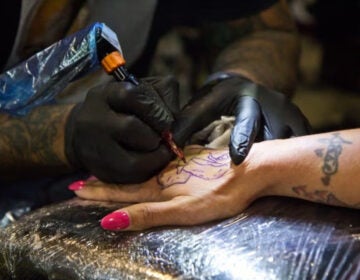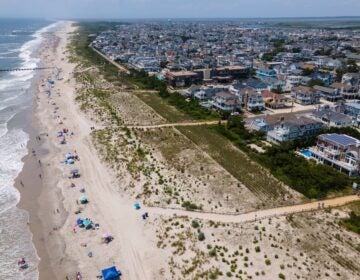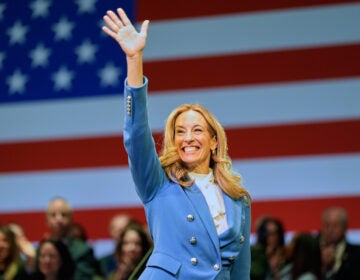How ‘Bridgegate’ changed Governor Christie’s political fortunes

The George Washington Bridge (Big Stock file photo) and Donald Trump and Chris Christie at a campaign event on March 1
A former federal prosecutor and Republican governor in Democratic-leaning New Jersey, Gov. Chris Christie earned a reputation as a no-nonsense, law-and-order leader. He was popular with late-night TV hosts and topped national polls as a prospective 2016 presidential candidate.
Then came “Bridgegate.”
It started three years ago this month, when two of the three approach lanes to the George Washington Bridge connecting New Jersey and Manhattan were shut down as part of what prosecutors say was a political payback scheme orchestrated by Christieallies.
As the trial begins for a former top aide and appointee to the agency that operates the bridge,Christie’s approval ratings at home are at record lows after a failed presidential campaign, and his political future is uncertain.
Christie, who denies any wrongdoing and has not been charged, recently dismissed the attention on the trial as a media fascination that will be over by October. But he also said the scandal probably affected Republican presidential nominee Donald Trump’s decision not to pick him for a running mate.
“I’m sure it was a factor,” Christie said in an interview on MSNBC on Wednesday.
A closer look at how the governor’s fortunes have changed since the scheme first came to light and what the trial could mean for his political future:
BEFORE THE SCANDAL
Prosecutors say the lane closures were political payback orchestrated by Bridget Kelly, Christie’sdeputy chief of staff at the time, and Bill Baroni, deputy executive director of the Port Authority of New York and New Jersey at the time, against the Democratic mayor of Fort Lee, the community at the foot of the New Jersey side of the bridge, for failing to endorse Christie in his 2013 re-election effort.
The governor’s outreach to Democrats and wide margin of victory were seen as a powerful line on his political resume ahead of a prospective presidential race, bolstering claims he could carry women and minority votes in competitive states.
In a December 2013 news conference, Christiedismissed questions about the lane shutdown, going so far as to joke with reporters that he actually moved the traffic cones himself.
Those comments came around the time CNN and Fairleigh Dickinson University polls showed him with high favorability and leading the GOP field of prospective 2016 Republican candidates.
‘TRAFFIC PROBLEMS’ AND INDICTMENTS
The story broke open in January 2014 when an email from Kelly that said “Time for some traffic problems in Fort Lee” surfaced as part of a legislative inquiry.Christie held a long news conference disavowing the scheme and announcing the firing of key staff members.
In May 2015, federal prosecutors charged Kelly and Baroni, whom Christie had appointed, with wire fraud and civil rights violations. They have pleaded not guilty.
David Wildstein, another Christie appointee at the agency, pleaded guilty and is expected to testify at the trial.
A FAILED CAMPAIGN
By the time Christie’s presidential campaign kicked off about two months after the indictments, his posture toward the scandal was set: It was old news.
Christie denied any involvement or knowledge and pointed to a taxpayer-funded probe that cleared him. He also highlighted a legislative inquiry that failed to link him directly to the closures.
Voters in Iowa and New Hampshire said they cared little about the regional imbroglio, but the scandal featured in opponents’ attacks.
While Christie is now leading Donald Trump’s transition team, Trump said in December that Christie”totally knew” about the lane closings. It was also used as an attack in an ad from a super political action committee that supported Marco Rubio, one ofChristie’s rivals in the New Hampshire primary.
“It’s never one thing,” said Ben Dworkin, the director of the Rebovich Institute for New Jersey Politics. “You can’t say he lost because of Bridgegate. But did it stop his momentum? I think that’s clear.”
‘SIX WEEKS OF REVELATIONS’
While not-guilty verdicts would clearly be victories forChristie, Montclair State University political science professor Brigid Harrison said that even guilty verdicts could do little harm to the governor’s reputation unless there is new evidence linking him to the scheme.
It’s not known if Christie will be called to testify, but the run-up to the trial has included questions about text messages he exchanged with an aide, and a message from a former aide that Christie “flat-out lied” when he denied his senior staff and campaign manager were involved. Christie denies that he lied.
Dworkin predicted the trial itself could reveal less-than-flattering details about how the Christieadministration conducted politics leading up to and surrounding the closure.
“We’re going to have six weeks of revelations of how the Christie administration did business,” Dworkin said. “It’s not necessarily going to be positive because we’re going to hear detail after detail about how they played politics— rough politics, Jersey politics — with mayors.”
WHYY is your source for fact-based, in-depth journalism and information. As a nonprofit organization, we rely on financial support from readers like you. Please give today.




